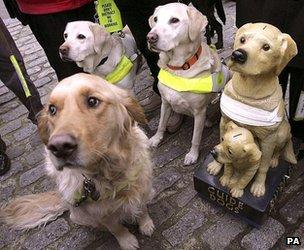Guide dog owners denied access, says charity
- Published

There are more than 4,700 guide dog owners in the UK
Guide dog owners are being illegally refused access to shops, restaurants and transport, research has suggested.
The charity Guide Dogs said complaints had "rocketed" in the last few months, and risen by more than a third since last year.
The worst offenders were restaurants, public transport and taxis, according to the charity's report, which focused on almost 400 complaints it received.
Guide Dogs said problems arose from poor training or ignorance of the law.
The charity's chief executive, Richard Leaman, said: "More awareness is needed to avoid blind and partially sighted people having to cope with this stress and discrimination in their daily lives.
"Although business owners are often eager to comply when we speak to them, our report shows that the situation is very different on the ground."
He said he feared their findings may represent "just the tip of the iceberg" as the research only took into account complaints made to them.
"We feel that more of the problems come down to poor training or ignorance of the law, and call on all organisations to ensure guide dog partnerships are welcome everywhere, anytime."
The Disability Discrimination Act (DDA) says business owners must make "reasonable adjustments" to make their premises' accessible to disabled people, such as waiving a no dogs policy for assistance dogs.
There are more than 4,700 guide dog owners in the UK, Guide Dogs says.
The average working life of a guide dog is five to six years and the lifetime cost of a dog is about Β£50,000.
- Published27 April 2011
- Published11 January 2011